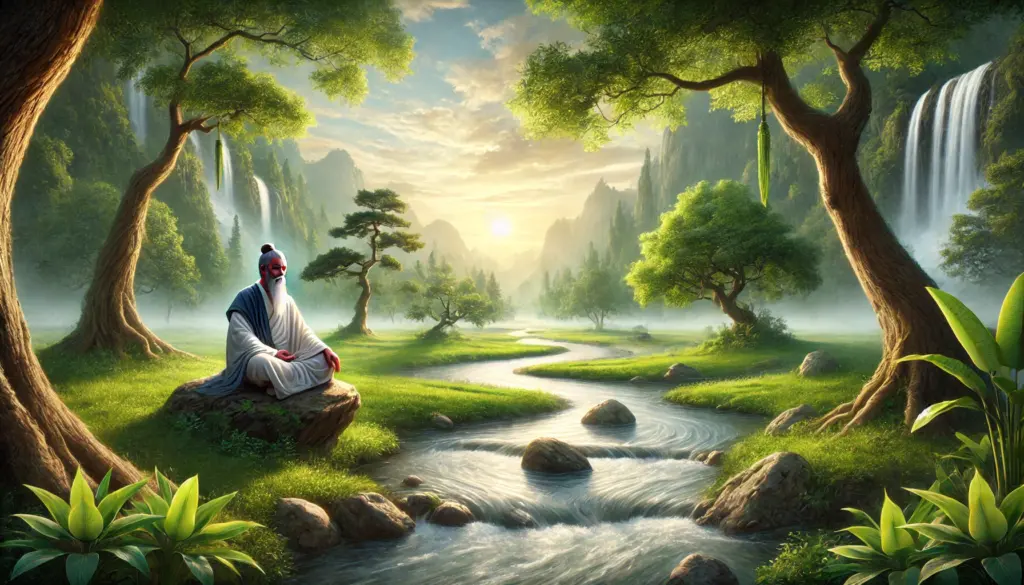
Taoism and Confucianism are two important philosophies embedded in Chinese culture. Each provides unique pathways to know the Self, be at peace, and find happiness.
These traditions arose in response to political and societal instability in ancient China, but differ widely on life, morality, and spirituality – despite sharing cultural backgrounds.
This article looks at the similarities between Taoism and Confucianism, while pointing out their differences. We’ll explore the teachings of Lao Tzu (the founder of Taoism) as well as Confucius (the founder of Confucianism. In each, we’ll find personal inspiration and unique pathways to freedom – for individuals and for the human collective.
Both Taoism and Confucianism emerged during the Zhou Dynasty – a time characterized by unstable governments. The aim of these ideologies was to restore order and confidence in the self, the family, communities, and society.
These philosophies are optimistic about human nature and hopeful about our ability to transmigrate from pain to peace. They teach us that everyone can improve themselves and their realities.
For instance, according to Confucius, education coupled with virtuous conduct fosters ren (virtue). Meanwhile, according to the Tao te Ching, wisdom arises from embracing the natural flow and aligning with one’s true self. Seemingly contradictory, but based on the idea that human beings are good, deep, and have great virtue within them.
However different these schools might appear to be, both of them emphasize virtue as highly important. While this may be less prescriptive within Taoist philosophy, which promotes simplicity among other virtues necessary for living according to its principles, like humility and compassion, Confucianism prescribes filial piety, righteousness, propriety, etc., all regarded as essential virtues.
Their philosophical emphases diverge considerably when they delve into social paradigms.
Social orderliness is what matters most to Confucius – who teaches that order begins within individuals, and then extends outwardly through families, communities, regions, and nations. Therefore the work of this master deals primarily with relationships, duties, societal roles, and the development of a virtuous character.
Lao Tzu’s writings highlight universal law underlying everything — and the Tao (“The Way of The Universe”). He teaches that humans should live harmoniously and embrace simplicity, tranquility, and personal happiness – instead of striving for social approval, dominance, desires, and similar.
Confucians believe that structured education and active participation in society are advantageous for everyone. He taught that moral excellence and daily practices of personal ethics were vital to peace and harmony – because it helped people become truly virtuous, conscious of others, and aware of their contributions – which benefit everyone.
On the contrary, Lao Tzu’s notion of Wu Wei encourages effortless action. If we do not impose anything on others or plan too far ahead, we allow for authentic spontaneity and protect ourselves from the complacency found in routine. He teaches that we must remain open-minded and consider the ideas that are cultivated naturally within us. He tells us that this is the path to enlightenment – where all beings can exist harmoniously – and free from the suffering caused by ignorance.
Lao Tzu has said “A journey of a thousand miles begins with a single step.” “Nature does not hurry, yet everything is accomplished.” In these quotes, he suggests that we should trust our natural pace within our lives – and do so without fear.
Confucianism and Taoism give deep insights into human nature and teach us the pathways to free ourselves from suffering caused by our aggression and attachment to worldly things. Both inspire us spiritually and psychologically so that we can transcend the most heinous challenges and tragedies.
From Lao Tzu, we learn about aligning with the flow of natural processes – instead of fighting against every aspect that emerges in our realities. He asks us to appreciate simplicity; be humble towards others; have compassion for all beings, and peace within the moment. This teaching encourages us to flow with Creation, rather than object to its many inconveniences.
Taoist principles can change your daily existence forever! Where are you trying too hard? What outcomes are you trying to force upon reality? Stop it! Go with the flow instead and let things happen naturally. Simplify your life by getting rid of clutter and focusing only on what truly matters most to you. Try meditation or spend time outside, breathing deeply and connecting more closely with everything else living on Earth alongside us every day. Be open-minded about learning new things from different people who may not look or talk like you but still have something valuable to share because they’re human too, flaws included. Rigid planning won’t work well either, so take a step back and relax, knowing everything will turn out alright eventually.
Confucian principles can be easily incorporated if one starts small, reflecting on their own relationships and responsibilities first, then moving outward towards larger communities such as workplaces and schools. Strive always to act ethically, no matter how difficult it may be at times. Due diligence requires continuous lifelong learning and self-improvement activities like reading literature, studying philosophy, practicing ethics, and engaging in rituals and traditions that foster belongingness, respect, and appreciation for heritage. Develop virtues such as honesty, kindness, patience, loyalty, altruism, generosity, humility, and tolerance.
Both traditions provide an abundance of wisdom, guiding us towards a more peaceful and satisfying existence. Embracing these teachings allows for graceful navigation through life’s complexities with purposefulness. Let us rise together in freedom, inspiring others to cultivate peace within themselves while harmonizing the world around them. May Lao Tzu’s and Confucius’ timeless teachings help you achieve balance, empathy, and depth in your life.